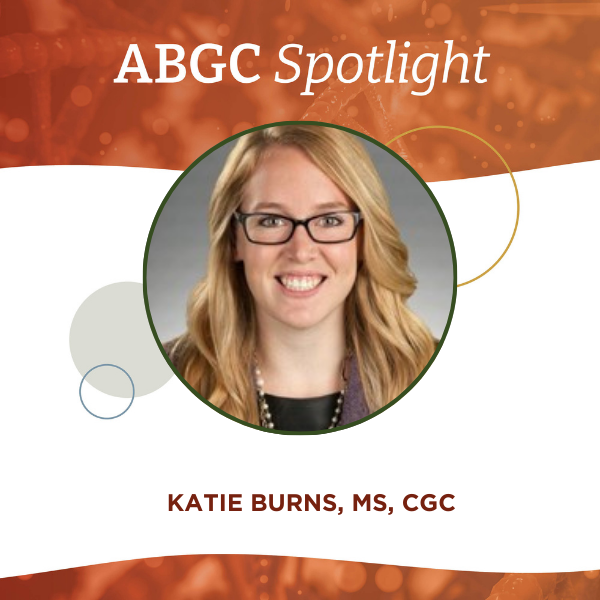 Katie Burns, MS, CGC, is a pediatric genetic counselor at the Sanford Children’s NICU. Her unique role is one she worked to create alongside her team. Read on for inspiration and reflection from this month’s ABGC spotlight.
Katie Burns, MS, CGC, is a pediatric genetic counselor at the Sanford Children’s NICU. Her unique role is one she worked to create alongside her team. Read on for inspiration and reflection from this month’s ABGC spotlight.
ABGC: Can you tell us a bit about your background and what inspired you to pursue a career in genetic counseling?
Katie Burns, MS, CGC (KB): When I started my undergraduate degree, I didn’t really know what I wanted to do, although I had an interest in sciences. Initially, I considered pursuing a career in medicine or as a physician assistant. However, after engaging in several kinds of research programs during my undergraduate experience, I decided to enter a PhD program in basic biomedical sciences after graduation. After a year of that, and realizing that would not fulfill my career aspirations, an instructor suggested I look into genetic counseling. The Augustana program was just starting up, so I met with the program director and did some shadowing and found a perfect fit! I love how it combines science, the why behind disease, and counseling aspects in finding information that patients and families value and desire.
ABGC: What has been the most rewarding aspect of your work in genetic testing coverage for Medicaid in South Dakota?
KB: As a GC, I definitely see the value that genetic testing brings to the patient and family but understand that we have to establish sustainable practices in the larger health care setting. Working with our state Medicaid representatives has helped ensure we understand the logistics and reality of health care billing, along with providing government agencies expertise and insight into how genetic testing plays such an important role to patients and to the larger health care system in many downstream ways. I am grateful that our Medicaid program looked to get expert advice from genetics professionals when working on this policy, and am grateful for many other people (GCs, MDs, hospital administrators and government representatives) contributing to this effort.
ABGC: How did you advocate for your new role as a NICU genetic counselor, and what changes have you seen since taking on this position?
KB: My institution has been engaged with genetics and testing in the inpatient setting for some time. With the emergence of new literature highlighting an increased diagnostic yield, access to advanced technologies, and enhancements in reimbursement and payer coverage, we felt it was an opportune moment to establish a designated role for the NICU. I collaborated with our genetics team, neonatologists and hospital leadership to thoughtfully define this role, and am grateful that my insights have been welcomed and valued throughout this process. I am also very thankful for the resources provided by NSGC’s inpatient special interest group, as many experienced inpatient genetic counselors have provided insight into how roles look elsewhere.
One thing that I feel like is unique to my role that we have built into the development, is that I introduce myself as a resource to almost all families in our unit, available to answer general questions or take a family history as a sort of genetic health “screen,” even when a baby may not meet the criteria for a comprehensive genetic evaluation. We have created general criteria to guide the NICU team on when to consider a genetics evaluation, and I do my best to assist in identifying these opportunities. I also have partnered with our maternal fetal medicine team to help with postnatal genetic testing coordination using cord blood or pre-delivery consultations. I have found that there are lots of genetics questions that come up when a genetic counselor offers the time and resources to be available for families, rather than just waiting on a provider to consider or consult for genetics.
ABGC: What challenges have you faced in your career, and how have you overcome them?
KB: The field of genetic counseling has experienced significant growth, yet I continue to feel frustrated by challenges related to equity and access to genetics services. I am fortunate to be in an area with a considerable number of genetics professionals available to our population, and my institution has generally been supportive of genetics services. However, I recognize that this is not the case everywhere. I am collaborating with the Genetics Access and Testing Empowerment (GATE) work group on various initiatives aimed at addressing this important issue. I really enjoy education of non-genetics providers as a way to expand access and working with other genetic counselors in different settings to find ways to practice efficiently.
ABGC: Can you share about your life outside genetic counseling?
KB: I am a mom to two boys and wife to a sports fanatic husband. We enjoy participating in our local church, trying new restaurants, doing any and all outdoor activities. If I ever have some quiet time, I recently got into playing Nintendo Switch games and always have a good book on my Kindle!